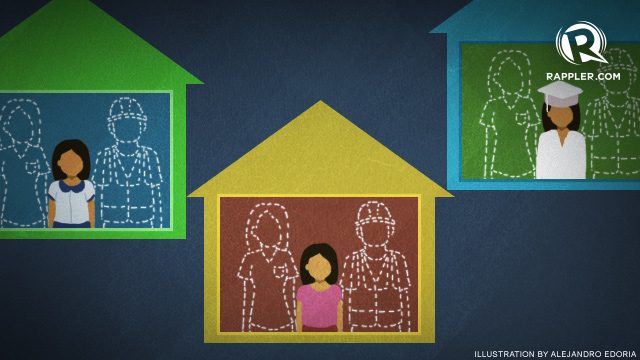SUMMARY
This is AI generated summarization, which may have errors. For context, always refer to the full article.
 Before my mother joined my father in Saudi Arabia, they exchanged audio tapes, which included quotidian details of her day (what she ate, what she bought). They were touching but the ones that made my bones ache were the brief moments of dead air before “I miss you” and a click. She had stopped recording.
Before my mother joined my father in Saudi Arabia, they exchanged audio tapes, which included quotidian details of her day (what she ate, what she bought). They were touching but the ones that made my bones ache were the brief moments of dead air before “I miss you” and a click. She had stopped recording.
My family and I grew up together in Saudi, but that is not the case for millions of Filipinos, who send balikbayan boxes to their families back home. They send care packages with soap, clothes, Coach bags, iPads.
What might initially look like garden-variety consumerism and an obsession with the imported is far sadder. I used to think of them as materialistic weight, but older now, I see them for what they really are: ersatz substitutes for human contact.
“These dresses from Macy’s,” they say, “I send with all the love in my body. I’m sending you this iPhone so we can Facetime as often as you need me, even if you think I’m asleep. This can of corned beef, I would have cooked for you if I were there.”
At last count, there are more than 10 million Filipino migrants scattered all across the world: Couples who have been married 20 years have spent only a total of several months together at the same table, in the same bed. Mothers raise others’ children and children see their parents for hiccups every few years.
I read much about recruitment agencies and the financial promises of jobs abroad. OFW remittances help not only the family but also the Philippines, whose economy cannot survive without them. When OFWs finally return to the Philippines, NAIA is festooned with banners that welcome back the “Bagong Bayani” (The New Hero).
As nice as these banners are, I’ve often felt unsettled by how these easy platitudes and taglines gloss over the social cost of the billions of dollars wired to the Philippines. Every year when I go to the POEA office, I am reminded of my so-called benefits, such as an airport terminal exemption – a paltry sod of pottage for people they call heroes. It is hardly a gift or a thank you.

I loved Coca-Cola’s “Where Will Happiness Strike Next: The OFW Project,” but at the end of the commercial, I thought of how, at the end of their snippet of a vacation, they, too, would return to work, unsure of when they would return home.
There is no sign of this kind of diaspora slowing down. I’ve read that the Philippines is the second fastest growing economy in Asia and pictures of Makati show a glittering landscape.
Of course Filipinos are happy about these statistics. However, while the numbers include a steady rise in remittances, I wonder whether these projections include the return of OFWs. Do these business magazines include the OFWs’ happiness in their metric for success?
In Saudi, a significant percentage of that number is “single”, but that category is a misnomer because many of them are married and have families back home. They send their paychecks to their wives and husbands in the Philippines. Some see their families only once a year and others still have two, 3, and 5-year contracts.
Where I live in America, I know Filipino nannies here who take care of American children, while their own grow up without them. Aunts and uncles, who work as mechanics and nurses in Saudi, send home Jergens lotion and Hershey kisses for Christmas.
On my Facebook newsfeed, families tag each other on photos they are not in. A childhood friend F. recently left his young wife and son for a job in Canada and Facebook comments range from “Ang suwerte mo” (You’re lucky) to “konting tiis lang” (“try to stand [the homesickness], just a little bit”). For many Filipinos, the dream job takes them abroad.
My uncle N., who speaks with the heart of Rocky Balboa, and my aunt B., who painted my toddler nails, tiny as 3 grains of rice, have not seen their children, who live in the Philippines, in more than 10 years.
They work in New Jersey as undocumented immigrants. The last time I visited them, I was 27 years old. As my uncle climbed the stairs with my bags, my aunt said, “No, she’s sleeping in our room.”
I slept in a princess bed, my feet dangling off the edge, and I woke up to a glass of water on my nightstand, I, their substitute daughter. On Facebook, I see pictures of gifts they’ve bought each other and wallposts of “I’m trying to Facetime you.”
In the waiting lounge at NAIA, fellow Overseas Foreign Workers (OFWs) split their ensaymadas with each other and pass each other tissues. Because I am crying (I still cry when I say goodbye to my parents every summer), they think it’s my first time to leave and they tell me it gets easier. The private wish is that their hearts didn’t have to travel thousands of miles to be home.
“Yes, yes,” they assure me, “Before you realize it, you’re boarding another plane home and it will feel as if no time has passed.”
When you’re an OFW, you have to pretend you believe in a time paradox: that it speeds up for the OFW, while it slows down for everyone else. You have to delude yourself into thinking it slows down or stops altogether.
This, for me, the most loving kind of illusion, these OFWs who build houses they do not live in and support children they cannot embrace. – Rappler.com
Kristine Sydney is a private high school English teacher in the United States, where she has lived for 20 years. Born in the Philippines and raised in Saudi Arabia, she attended boarding school and college in the US, where she practiced her Tagalog by reading Liwayway. She writes about immigration, Air Supply adoration, and her intercultural relationship on her blog kosheradobo.com. Follow her on Twitter @kosheradobo.
Read previous stories from this author
• Pacquiao ‘insult’ a cultural misunderstanding
• How asking ‘Are you Filipino?’ can save a life
• Our interracial and interfaith marriage: Yes, color matters
Add a comment
How does this make you feel?
There are no comments yet. Add your comment to start the conversation.